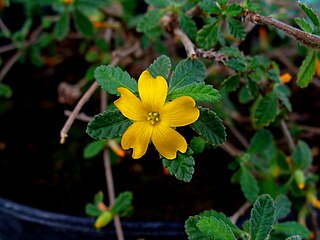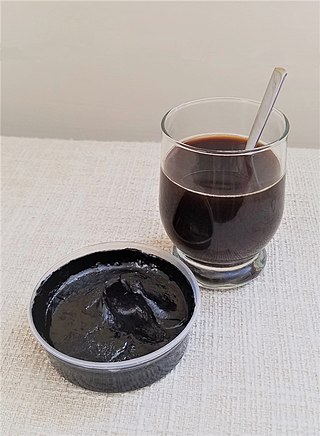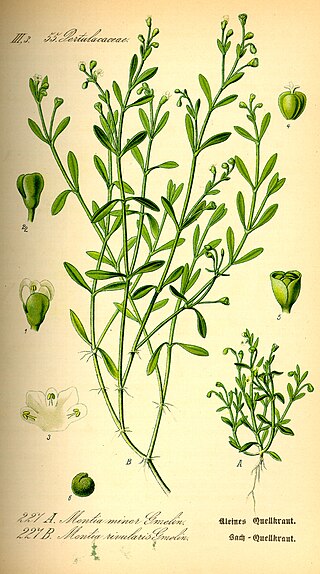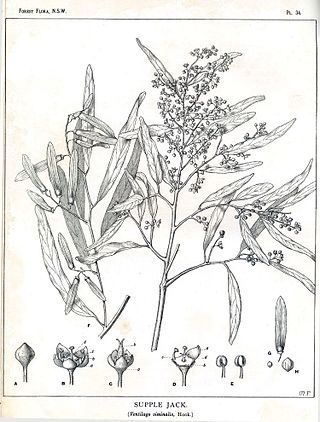
Flavonoids are a class of polyphenolic secondary metabolites found in plants, and thus commonly consumed in the diets of humans.

Flavan-3-ols are a subgroup of flavonoids. They are derivatives of flavans that possess a 2-phenyl-3,4-dihydro-2H-chromen-3-ol skeleton. Flavan-3-ols are structurally diverse and include a range of compounds, such as catechin, epicatechin gallate, epigallocatechin, epigallocatechin gallate, proanthocyanidins, theaflavins, thearubigins. They play a part in plant defense and are present in the majority of plants.

Gentianaceae is a family of flowering plants of 103 genera and about 1600 species.

Turnera diffusa, known as damiana, is a shrub native to southern Texas in the United States, Central America, Mexico, South America, and the Caribbean. It belongs to the family Passifloraceae.

Joi Baba Felunath is a 1979 Indian Bengali-language mystery film directed and written by Satyajit Ray. Featuring an ensemble cast of Soumitra Chatterjee, Santosh Dutta, Siddartha Chatterjee, Utpal Dutt amongst others, it is an adaption of the eponymous Feluda novel and serves as the sequel of Sonar Kella. Shortly after the demise of actor Santosh Dutta who portrayed Jatayu's role, Ray remarked that it was impossible to ever make a Feluda film again without Dutta.
Adaptogens or adaptogenic substances are used in herbal medicine for the claimed stabilization of physiological processes and promotion of homeostasis.

Shilajit or Mumijo is a blackish-brown powder or an exudate from high mountain rocks, often found in the Himalayas, Badakhshan- Afghanistan, Karakoram, Gilgit-Baltistan - Pakistan, Nepal, Bhutan, Russia, Central Asia, Iran, Mongolia and in the south of Peru, where it is called Andean Shilajit. Also known as μούμια, Mumiyo, Brag-shun or Barakhshin, Rock sap or Rock juice, Marathi or Gujarati, شلاجیت Asphalt, Silajita, Silajatu, Hajarul-Musa or Araq-al-jibal, Myemu, Moomiaii or Mumnaei, Mumie, Mineral Pitch, Jew’s Pitch, Mineral Wax, Kao-tun, Tasmay and Slag (China), "Blessing of Nature" (Nepal).

Montia is a genus of plants in the family Montiaceae. Species in this genus are known generally as miner's lettuce or water chickweed. All of the species in the genus have edible leaves. It is found worldwide, except in Asia.

Tahader Katha is a 1992 Indian Bengali-language drama film directed by Budhhadeb Dasgupta, starring Mithun Chakraborty, who won the 1993 National Film Awards for Best Actor for the film, while the film won the National Film Award for Best Feature Film in Bengali.

Ventilago is a genus of plants in the family Rhamnaceae. It includes about 40 species found in the tropics of South and SE Asia, Australasia, with one species each in Africa and Madagascar.
Gharjamai is a 2008 action Bengali film Directed by Anup Sengupta. This Anup Sengupta film is sometimes confused with the Hindi film Jamai Raja starring Anil Kapoor, Hema Malini and Madhuri Dixit. The title Gharjamai refers to a man who is financially dependent on his wife's family, which carries a social stigma in cultures of the Indian subcontinent.

Boerhaavia diffusa is a species of flowering plant in the four o'clock family which is commonly known as punarnava, red spiderling, spreading hogweed, or tarvine. It is taken in herbal medicine for pain relief and other uses. The leaves of Boerhaavia diffusa are often used as a green vegetable in many parts of India.

The 3-Deoxyanthocyanidins and their glycosides are molecules with an anthocyanidins backbone lacking an hydroxyl group at position 3 on the C-ring. This nomenclature is the inverse of that which is commonly used in flavonoids, where the hydroxy-group is assumed absent if it is not specified, e. g. flavan-3-ol, flavan-4-ol, flavan-3,4-ol and flavonol.

Leucoanthocyanidin (flavan-3,4-diols) are colorless chemical compounds related to anthocyanidins and anthocyanins. Leucoanthocyanins can be found in Anadenanthera peregrina and in several species of Nepenthes including N. burbidgeae, N. muluensis, N. rajah, N. tentaculata, and N. × alisaputrana.

The flavans are benzopyran derivatives that use the 2-phenyl-3,4-dihydro-2H-chromene skeleton. They may be found in plants. These compounds include the flavan-3-ols, flavan-4-ols and flavan-3,4-diols (leucoanthocyanidin).

Diffutidin is a flavan, a type of flavonoid. It can be found in Canscora diffusa.

Canscora diffusa is a plant species in the genus Canscora. Diffutidin and diffutin are flavans, a type of flavonoid, found in C. diffusa.

Canscora is a genus 9 to 30 species of plants in the family Gentianaceae. Canscora is native to Africa, Asia and Australia. Some species are used medicinally.

Hoppea dichotoma is a plant species in the genus Hoppea.

Canscora bhatiana is a flowering plant in the family Gentianaceae. It is named after Prof. K. Gopalakrishna Bhat, Department of Botany, Poornaprajna College, Udupi.

















